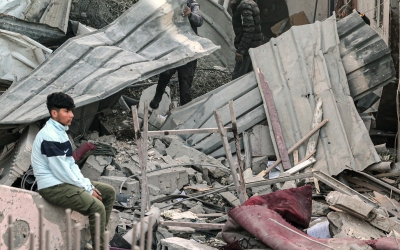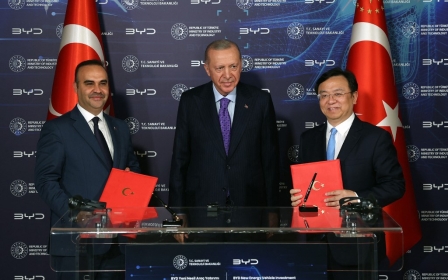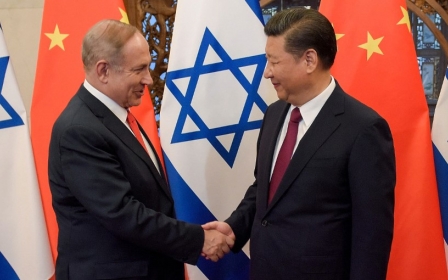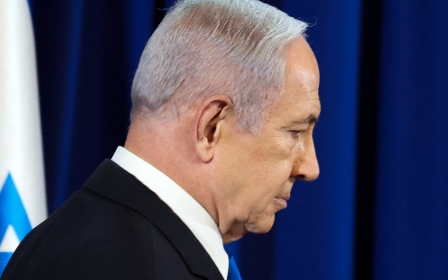China challenges West on Gaza by offering Palestinians a new platform
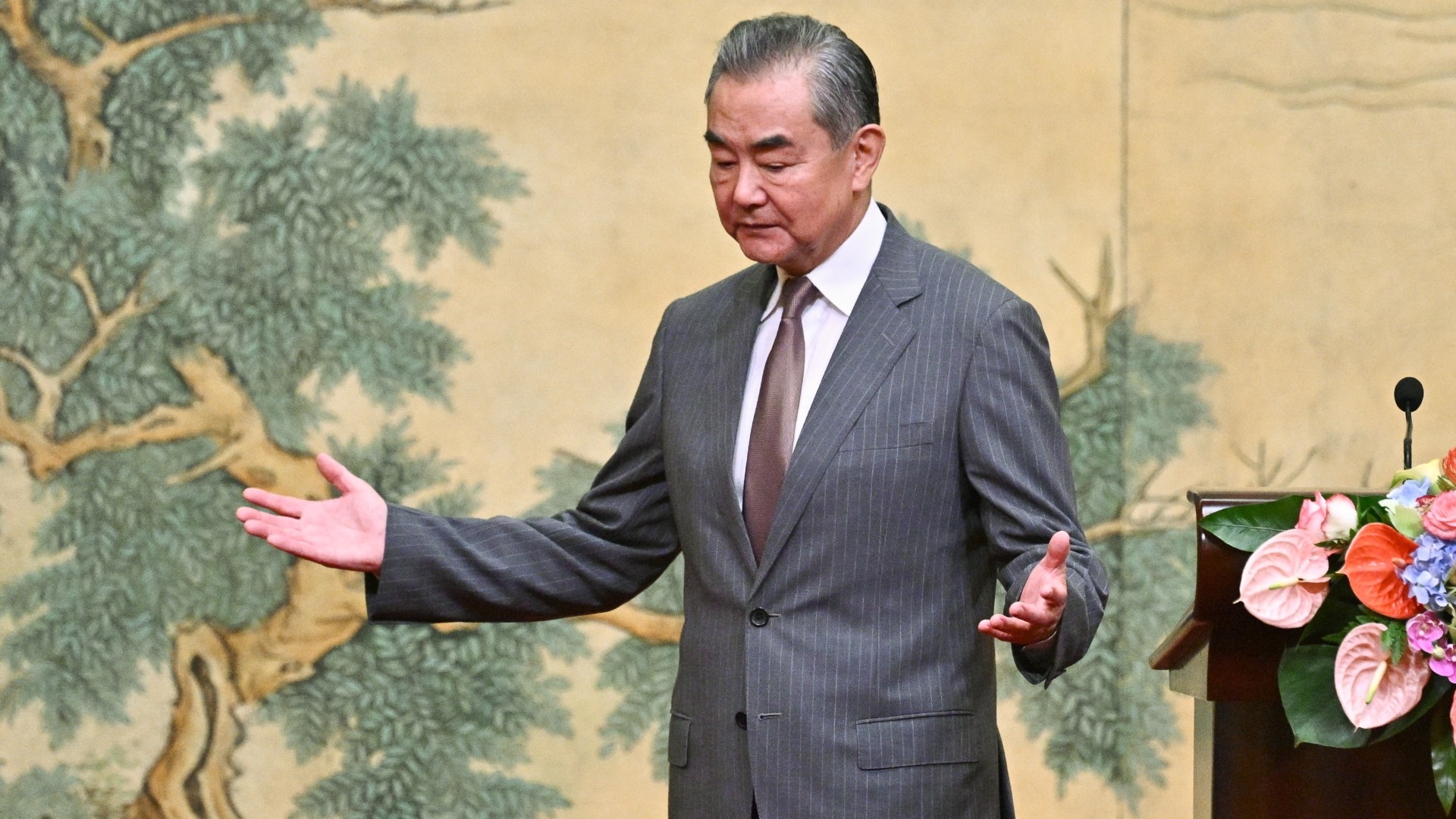
As 14 Palestinian leaders lined up for a photograph in Beijing on Tuesday, they each made sure to shake hands afterwards with one man: Chinese Foreign Minister Wang Yi.
Tuesday’s Palestinian unity talks, where an agreement for a post-war Gaza framework was signed, were an opportunity for China to provide a rival platform to Israel and its western allies on the future of Palestine and the Middle East.
“China’s major goal is to gain consent and acknowledgment among regional countries regarding its rising status as a responsible country with a superior moral role compared to the US,” Razan Shawamreh, a Palestinian expert on China's foreign policy in the region, told Middle East Eye.
Hamas and Fatah, the two main rival Palestinian factions, have attempted reconciliation several times to put an end to 17 years of dispute, including talks which began in China in April.
Though efforts have barely made progress in the past, the involvement of Beijing now offers unique incentives to break away from the influence of Washington, including for Palestinian President Mahmoud Abbas.
New MEE newsletter: Jerusalem Dispatch
Sign up to get the latest insights and analysis on Israel-Palestine, alongside Turkey Unpacked and other MEE newsletters
“[Abbas] wants to show the Americans and also the Arabs that ‘I have other choices’,” Hani al-Masri, director general of Masarat, the Palestinian Centre for Policy Research and Strategic Studies, told MEE.
'[Abbas] wants to show the Americans and also the Arabs that 'I have other choices''
-Hani al-Masri, director general of Masarat
“He is concerned about Trump being elected,” Masri said, as well as the recent vote in Israel’s parliament that overwhelmingly passed a bill rejecting the establishment of a Palestinian state - even as part of a negotiated settlement with Israel.
According to Masri, there will be other concerns on Abbas’s mind. In the occupied West Bank there is widespread dissatisfaction with the Palestinian Authority (PA), which is being starved of tax revenue by Israel and struggling to pay its employees.
There are also rumours, Masri notes, that Mohammed Dahlan - an exiled Palestinian politician now advising the UAE president - may be parachuted back into Palestine at the behest of Arab powers sympathetic to Washington.
For Hamas, China-backed discussions give it a rare platform to participate in international forums.
“Hamas accepted the invitation to break the international isolation imposed by Washington and its allies, who accuse it of terrorism,” Shawamreh said.
“China’s invitation to Hamas opens the way for it to communicate internationally with Washington’s competitors,” she said, adding that Beijing ignored Israel’s request to designate Hamas a terrorist organisation.
China wants 'new global order'
The Palestinian unity discussions are Beijing’s latest effort at playing a role in mediation in the region: it hosted talks last year that led to the restoring of ties between Iran and Saudi Arabia.
'China has ... positioned itself as a peacemaker and a viable alternative to the US'
- Sari Arho Havren, analyst
“China has long advocated for a new global order and global governance, aiming to reduce the influence of the US on the global stage,” Sari Arho Havren, a specialist on Chinese foreign relations, told MEE.
“China has also sought a more prominent role in international politics and positioned itself as a peacemaker and a viable alternative to the US. This is evident in its actions in the Middle East, where it aligns with parties that oppose the US and its allies.”
Andrea Ghiselli, head researcher at TOChina Hub’s ChinaMed Project, noted that China’s growing influence in the region was not all due to Beijing’s own actions.
“In this moment there is an unprecedented convergence between China’s interests, goals, and narratives and those of most of the leaders in the Middle East,” he told MEE.
“When it comes to Gaza, it is evident that supporting the Palestinians is a position that can hardly be described as uniquely Chinese since many people in the region and around the world, both Global South and Global North, share similar beliefs.”
China was capitalising, Ghiselli said, with an eye to gaining a competitive advantage over Washington.
China talks 'far from enough'
Tuesday’s agreement was met with a forceful rejection by Israel, whose Foreign Minister Israel Katz accused Abbas of embracing Hamas.
Katz said that no such unity agreement would occur because “Hamas’s rule will be crushed, and Abbas will be watching Gaza from afar”.
So far, Gaza ceasefire negotiations have been dominated by the United States, with Hamas and Israel failing to come to an agreement as the Palestinian group seeks assurances any truce will remain permanent.
Hamas has complained that Washington presents itself as an honest broker in the talks, while heavily backing Israel’s military and government in the war. It has asked China and Russia to be among the guarantors of any ceasefire deal.
While Chinese-backed post-war plans offer an alternative for Palestinian groups tired of the West’s approaches, which tend to favour Israel, it remains to be seen whether anything can really happen without the input of Israel’s western allies.
“The US is the dominant [actor] in the conflict, and China’s ability to influence it is limited,” said Shawamreh.
“Israel is the de facto controlling power on the ground with the full support of the West. Washington is the only power capable of significantly influencing the war and its aftermath.”
An observer of China’s foreign relations based in Beijing, who spoke on condition of anonymity to protect their position, told MEE that when it came to Iranian-Saudi negotiations, Beijing’s input only came at the time of signing the agreement, to add weight to the decision.
“I think it would have been the same for this agreement, China does not have the means to unblock the negotiations,” the source said.
While China has long been a supporter of the Palestinian cause - former leader Mao Zedong once described Israel as a “base of imperialism” - in more recent months it has been accused of using vague language and being "neutral" since war broke out in Gaza in October.
Ghiselli said that while China framed the Palestinian agreement as a diplomatic victory, there was unlikely to be any decisive development on a post-war framework before the US election.
“China-supported talks might help but are far from being enough,” he said.
Middle East Eye delivers independent and unrivalled coverage and analysis of the Middle East, North Africa and beyond. To learn more about republishing this content and the associated fees, please fill out this form. More about MEE can be found here.


